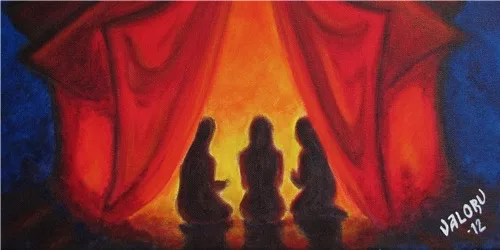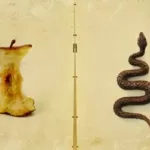 This weeks teaching on earth, birth, blood and sexuality we talked a lot about the blood mysteries within the Christian tradition. It interesting to note that while the early tradition has no such qualms the priestly tradition has a real issue with bodily fluids in general and bleeding women in particular.
This weeks teaching on earth, birth, blood and sexuality we talked a lot about the blood mysteries within the Christian tradition. It interesting to note that while the early tradition has no such qualms the priestly tradition has a real issue with bodily fluids in general and bleeding women in particular.
A bleeding woman was cut off from the tribe during her moon period and sent outside the community into a tent. This was a place of shame and separation if only for a short time, after her moon the woman was supposed to undergo a ritual cleansing before being allowed back into the tribe.
At the same time the moon period was considered sacred and a great blessing in many other traditions.
My invitation is that we through imaginative reframing of the Judeo-Christian narrative reclaim the red tent and make this place of shame a place of honour and power.
Indeed, the body does not consist of one member but of many. If the foot would say, “Because I am not a hand, I do not belong to the body,” that would not make it any less a part of the body. And if the ear would say, “Because I am not an eye, I do not belong to the body,” that would not make it any less a part of the body. If the whole body were an eye, where would the hearing be? If the whole body were hearing, where would the sense of smell be? But as it is, God arranged the members in the body, each one of them, as he chose. If all were a single member, where would the body be? As it is, there are many members, yet one body. The eye cannot say to the hand, “I have no need of you,” nor again the head to the feet, “I have no need of you.” On the contrary, the members of the body that seem to be weaker are indispensable, and those members of the body that we think less honorable we clothe with greater honor, and our less respectable members are treated with greater respect; whereas our more respectable members do not need this. But God has so arranged the body, giving the greater honor to the inferior member, that there may be no dissension within the body, but the members may have the same care for one another. If one member suffers, all suffer together with it; if one member is honored, all rejoice together with it. (1 Cor 12.14-26 NRSV emphasis added)
Here Paul is talking about the gathering of the tribe and people with different gifting in the tribe, but would this not also apply literally, indeed I think this is why Paul is using the image of the body, talking about the parts of the body that we feel shame about and how we should bestow them even greater honour and keep an even higher respect for those parts that we feel are less respectable.
So, with that in mind, what part of your body would you be ashamed of showing, what part of yourself, your body and your physical embodied life do you feel is less respectable? Is it your genitals, your period, your toes, your nose? Let’s take these places of shame and turn them into great pieces of power, honouring and respecting these parts of ourselves. Giving them extra care and attention. Let us recognise the power that comes just by breaking the shame and disrespect. The freedom that flows from showing the hidden and honouring the shamed and disrespected. Let us stop using diminishing and disempowering names for these parts and functions of our bodies our temples. But rather names of honour for these parts and body functions.
Whether you want to adopt sanskrit names like Yoni and Lingam for your private parts or call them other names, not mocking, not cute, but names of honour. What about owning your monthly flow and speak of it as your monthly blessing rather than in hushed and shamed tones. Let the red tent be the place of your power instead of a place of shame.





